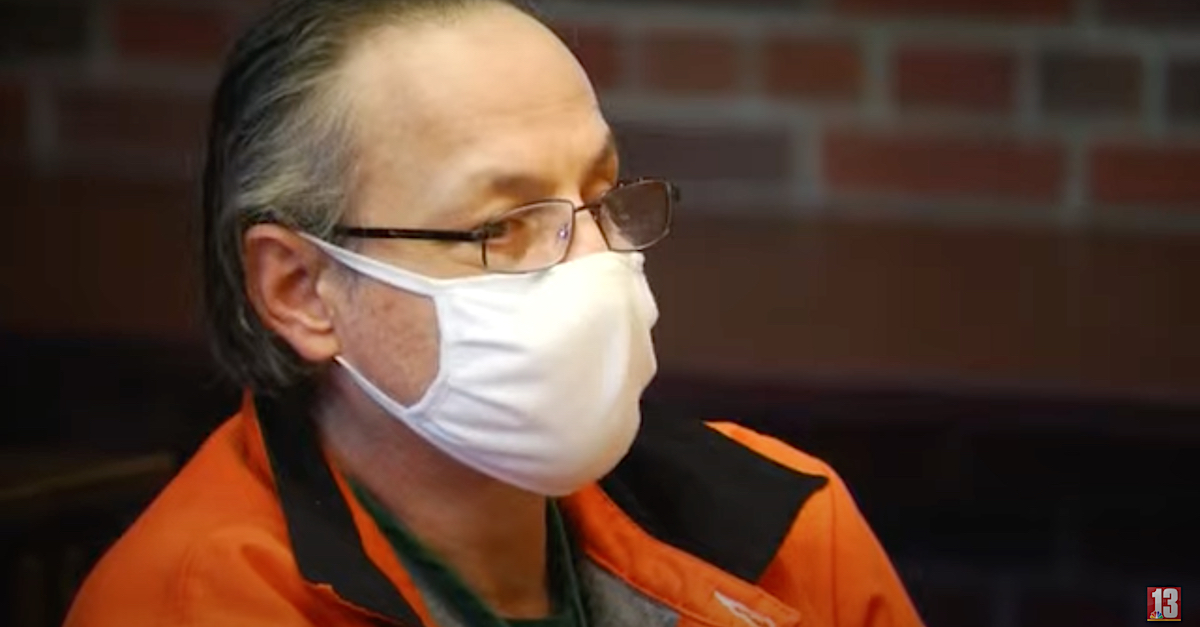
Allyzibeth Lamont appears in an image released by the Gloversville, N.Y. Police Department. Georgios Kakavelos appears in a mugshot released by the Saratoga County, N.Y. Sheriff’s Department.
A former Upstate New York restaurant boss has been sentenced to prison for murdering a young employee. A Saratoga County jury agreed with prosecutors that Georgios Kakavelos, 52, ordered the murder of Allyzibeth Lamont, 22, because Lamont was seeking to report Kakavelos to the authorities for paying her under the table — and without deducting the proper payroll taxes.
The Case
As Law&Crime previously reported, Kakavelos paid another employee, James Duffy, 35, between $1,100 and $1,300 to help him kill Lamont in 2019 and to dump the victim’s dead body in a shallow grave off Exit 13 of the Northway, an interstate highway an hour away in a neighboring county. Lamont died of severe skull fractures and brain damage, testimony revealed; the murder weapons were a baseball bat and a hammer. At sentencing, Judge Jim Murphy III noted that Kakavelos was responsible for crushing Lamont’s body and encasing it in concrete at the burial site in the Town of Malta.
Kakavelos, who prosecutors argued was the mastermind behind the killing, operated the Local No. 9 sub shop on Townsend Avenue, a commercial strip in Johnstown, N.Y., in Fulton County about an hour northwest of Albany. His wife was the business’s official owner. Kakavelos also previously owned two other diners, including one in Saratoga County, where Lamont’s body was eventually found. The crime spree spanned three counties in New York’s Capital District; some of the evidence tampering occurred in Albany County, the jury concluded.
Duffy was separately convicted and sentenced to 18 years to life in prison. He testified against Kakavelos and received a slightly more generous sentence on account.
Kakavelos complained prior to sentencing that he didn’t have an adequate opportunity to express his side of the story at trial. Prosecutors — and later the judge — noted that Kakavelos testified for three days. He was on the stand for one and a half days under direct examination by his own attorneys; he was cross-examined by prosecutors for another day and a half.
The judge also rubbished attempts by Kakavelos to claim he didn’t have adequate access to pretrial discovery material.
Kakavelos proceeded with a public defender at sentencing after jettisoning the assistance of Kevin O’Brien, his trial attorney. Sentencing was delayed several times due to the shift in counsel.

Georgios Kakavelos appears at sentencing via a WNYT-TV screengrab.
Victim Impact
The would-be restaurant scion — testimony revealed that Kakavelos was nervous that a labor complaint would get in the way of his plans to open another location — did not go to prison without harsh words from Lamont’s friends and relatives.
Brooke Lamont, the victim’s younger sister, called Allyzibeth the “light of the room.”
Her words for Kakavelos were harsh.
“You have no regard for human life. You disgust me; you make me physically sick,” the sister continued. “Now everybody knows who you truly are: a woman hating masochistic piece of shit who lies to get his own way.”
“You deserve the absolute worst,” Brooke Lamont said while struggling through tears. “She wasn’t a nobody like you thought.”
“I hope her memory haunts you; I hope your guilt eats you alive,” she continued after referencing the family’s ongoing “pain and torment.”
Tammy Quackenbush, the victim’s aunt, said she did not expect remorse from Kakavelos because the defendant had shown none thus far.
“You just need to know how you destroyed our family,” Quackenbush implored while bemoaning “a life we will never get to see.”
“To us, Ally will always be 22. We only have 22 years of memories of her,” she continued. “We will hold our memories in our heads forever.”
“She could have done anything,” Quackenbush added. “We will never understand why you did this.”
“I hope that you never get a moment’s piece ever again for what you did,” Quackenbush said while asking for a life sentence without the chance of parole.
Crista Lamont, the victim’s mother, called Kakavelos a “failure as a businessman” and “a failure of a human being.”
“Above all else, until the day you die, she will be in your head,” the mother continued. “You killed our daughter because you owed her money, and she stuck up for herself and others that you hurt. She wouldn’t be quiet. For the rest of our lives, we will not be quiet. We will keep speaking about Allyzibeth and the horrific acts that you committed to make sure you never have the opportunity to do this to another human being again.”
Sherman Lamont, the victim’s father, issued a written statement to the court which was read into the record.
He referenced a “monster in the deli” — Duffy, the co-defendant — and a “devil in the same room” — Kakavelos.
“I hope and pray that you die alone and scared,” the victim’s father said with reference to the defendant.
The father wrote that his daughter was his personal hero.
“If it wasn’t her you killed, it would have been someone else’s baby girl,” he also wrote. “I hope you rot in hell, Georgie. A piece of my heart is gone because of you.”
The victim’s older sister also wrote to the court.
“She worked herself to death — literally — to try to achieve her personal and lifelong goals,” the sister said. “She stood up for what was right . . . I will never understand why you did what you did, but that is for you to sit and think about.”
The State Department of Labor Speaks
New York State Department of Labor Commissioner Roberta Reardon took what Judge Murphy called the “remarkable” step of writing to the court with a request for an extremely tough sentence.
After extending “deepest sympathy” to the Lamont family, Reardon addressed the motive for the killing.
“Elizabeth came forward in good faith to report labor law violations to the Department of Labor to fight for justice for herself and her colleagues and became the victim of the most heinous act of retaliation against a worker that the New York State Department of Labor has ever seen,” the commissioner wrote. “I ask the court to consider the potential chilling effect in terms of sentencing that this murderer’s actions will have on workers who seek to exercise a basic and fundamental right: the right to report mistreatment and violations of the law. Workers in New York State must be able to report labor law violations without fear of retaliation.”
The letter urged the court to “dissuade any employer from acting” in such an “extreme and heinous matter” in the future.
“Allyzbeth is a hero to the workers she fought to protect, and while nothing can bring her back, you can honor her legacy by making sure she did not die in vain,” Reardon concluded.
The Sentence
Before handing down his sentence, Judge Murphy noted that it was very difficult for the victim’s family to sit in the same courtroom as the defendant.
“I applaud you for your bravery, your tenacity, your dedication, and your commitment to her life,” Murphy said to the Lamont family. “I can’t tell you how appreciative I am to hear it, because it does make a difference, and it will make an impact on the sentence.”
“All that Allyzebeth Lamont wanted was to get a paycheck and not be paid under the table,” the judge continued. He called Kalavelos “greedy,” “diabolical,” and “self-centered.”
The final sentence was life in prison without the possibility of parole for count one — first-degree murder. Count two was a lesser-included offense which merged with the other charges for the purposes of sentencing. Count two — conspiracy — landed Kakavelos a sentence of eight and one-third to 25 years behind bars. Counts four and five — concealing a human corpse — resulted in a sentence of one and one-third years to four years in prison. One of the counts related to the transportation of the victim’s body; the other related to actually burying it. Kakavelos was also sentenced to serve between one and one-third and four years in prison for counts six through 11 — all of which involved separate and distinct acts of tampering with physical evidence in multiple counties.
Judge Murphy said the sentences were to run concurrently. However, count five — the crushing of the body and the burial of the remains in concrete — was to be served consecutively, or after the life sentence was complete.
Kakavelos was also ordered to pay a $375 surcharge.
The judge also noted that it was “extraordinary” that several of the jurors who rendered a verdict after the six-week-long trial took time away from their employment, their social lives, and their families to attend the sentencing hearing.
“The interest, attention, and dedication” of the jurors was noted for the record.
Watch the sentencing hearing below via Albany, N.Y. NBC affiliate WNYT-TV: